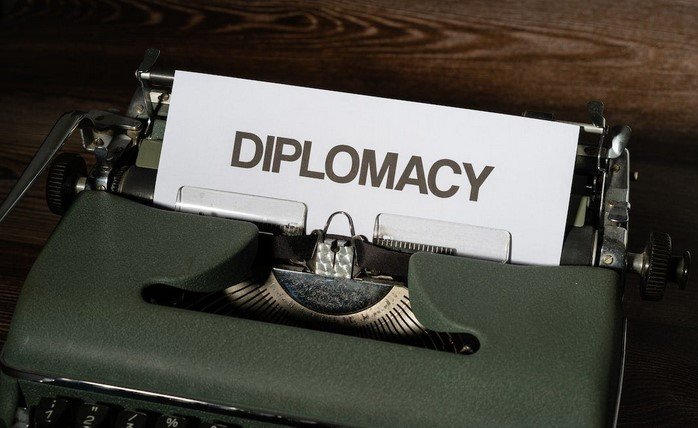Diplomacy plays a crucial role in resolving conflicts between nations and preventing the escalation of tensions into full-blown crises. It serves as a tool for negotiation, dialogue, and cooperation, helping to manage disagreements and find peaceful solutions. By leveraging diplomatic channels, countries can avoid war, maintain international stability, and promote mutual understanding. This post explores how diplomacy contributes to conflict resolution and why it remains indispensable in global relations.

Diplomacy as a Peacebuilding Tool
Diplomacy acts as a peacebuilding mechanism by providing a platform for dialogue. It allows conflicting parties to discuss their grievances and work toward mutually beneficial solutions. When tensions rise, diplomatic efforts often focus on de-escalating the situation through negotiations, mediations, and compromise. Skilled diplomats act as intermediaries, guiding discussions toward peaceful outcomes and ensuring that all sides feel heard.
In situations where hostilities have already erupted, diplomacy becomes a vital tool for ceasefire agreements. These diplomatic interventions create opportunities for conflict resolution, laying the groundwork for peace talks and long-term solutions. For example, international diplomatic efforts have been central to resolving numerous conflicts in regions such as the Middle East, Africa, and Eastern Europe.
Diplomacy Prevents Escalation
One of the core functions of diplomacy is to prevent the escalation of conflicts. Tensions between nations often arise due to misunderstandings, competing interests, or territorial disputes. Without diplomatic intervention, these disputes can quickly spiral into military confrontations. Diplomacy provides a framework for resolving these diplomatic conflict resolution before they reach a critical stage.
Through diplomatic channels, countries can communicate openly, reducing the likelihood of miscalculations or rash decisions. For instance, in the Cuban Missile Crisis of 1962, diplomacy between the United States and the Soviet Union helped prevent nuclear war. Leaders from both sides engaged in backchannel communications, ultimately reaching an agreement to de-escalate the situation. This historical example highlights diplomacy’s power in avoiding large-scale conflict.
Multilateral Diplomacy and International Organizations
Multilateral diplomacy, which involves multiple countries working together, is essential in managing conflicts that affect global stability. International organizations like the United Nations (UN), the European Union (EU), and the African Union (AU) serve as platforms for diplomatic efforts. These institutions bring nations together to address global challenges such as territorial disputes, civil wars, and humanitarian crises.
The UN, in particular, plays a significant role in conflict resolution through its peacekeeping missions and diplomatic initiatives. The Security Council, composed of member states, engages in diplomatic discussions aimed at promoting global peace and security. These multilateral efforts ensure that diplomacy is not limited to bilateral talks but involves the global community in resolving conflicts.
Diplomacy and Long-term Solutions
Diplomacy not only focuses on immediate conflict resolution but also aims at long-term peace and stability. After a ceasefire or peace agreement is reached, diplomats continue to work on establishing frameworks for sustained cooperation. This may involve rebuilding trust between former adversaries, setting up institutions to monitor peace agreements, or creating economic and social programs to address the root causes of conflict.
The Dayton Accords, which ended the Bosnian War in 1995, are an example of a diplomatic solution with long-term objectives. The accords were reached through intensive diplomatic negotiations, and they laid the foundation for Bosnia and Herzegovina’s governance and post-war reconstruction. By addressing political, territorial, and ethnic divisions, the accords helped promote stability in the region.
The Role of Diplomats and Special Envoys
Diplomats, ambassadors, and special envoys are the key actors in diplomacy. Their skills in negotiation, communication, and cultural understanding make them instrumental in resolving conflicts. Special envoys, often appointed by international organizations or governments, play an important role in mediating high-stakes conflicts. These envoys act as neutral intermediaries, facilitating dialogue between conflicting parties and helping them reach agreements.
One notable example is former UN Secretary-General Kofi Annan, who acted as a special envoy in numerous conflict zones. His diplomatic efforts in Kenya during the post-election violence of 2007-2008 were critical in brokering a power-sharing agreement and restoring peace. Envoys like Annan demonstrate how effective diplomacy, combined with personal credibility and negotiation skills, can lead to successful conflict resolution.
Conclusion
Diplomacy remains a cornerstone of conflict resolution, offering peaceful alternatives to war and violence. It fosters dialogue, prevents escalation, and promotes long-term peace, making it indispensable in maintaining global stability. Through multilateral efforts, international organizations, and skilled diplomats, diplomacy continues to resolve some of the world’s most complex conflicts. In a world where tensions are inevitable, diplomacy provides a path to peaceful coexistence and mutual understanding.